
ICAS Bulletin (online ISSN 2836-3418, print ISSN 2836-340X) is published every other week throughout the year at 1919 M St NW, Suite 310, Washington, DC 20036.
The online version of ICAS Bulletin can be found at chinaus-icas.org/bulletins/.

– Shein, the rapidly rising e-commerce and fast fashion brand, is seeking to diversify its supply chain amidst Washington’s concerns about its Chinese ties.
– Bernard Anault, CEO of LVMH, is planning to visit China during June to discuss details of increasing sales for the international fashion conglomerate in China.
– Executives at ExxonMobil are moving forward with a multi-billion-dollar petrochemical plant in Huizhou, China despite increasing bilateral tensions between the U.S. and China.
– Applications from U.S. companies to export sensitive technologies to China dropped by 26.2% between 2021 and 2022, according to the U.S. Department of Commerce.
– U.S. billionaires Elon Musk and Jamie Dimon completed independent, high-level business trips to China which included multiple visits with senior government officials.
– Despite speculations and the business community’s demands, Deputy USTR Sarah Bianchi stated that the U.S. will use analytical methods in its approach to keep tariffs on Chinese goods, and will not base the tariffs on “breakthroughs” in U.S.-China relations.
– Following U.S. and Japanese curbs on Chinese technology companies, Chinese stocks soared in an apparent act of ‘patriotic purchasing’ from local investors in China.
– Major U.S. biofirm Moderna Inc. has registered in Shanghai for a legal entity to operate business in China.
– The Chinese securities regulator will allow U.S. Morgan Stanley to create a Chinese futures company in Beijing.
– Jim Farley, CEO of Ford Motors, stated that Chinese electric vehicles (EVs) are the largest competitor for Ford’s own EV products.
– U.S. controls on China investments face criticism within the European Union, as European officials raise questions on possible effects to EU security.
Associated News References:
“Shein tries to thread US-China needle,” Reuters, June 4
“Billionaire Arnault Plans to Visit China After Musk and Dimon,” Bloomberg, June 1 [Paywall]
“Exxon Bets on China Chemicals Growth Even as US Relations Sour,” Bloomberg, June 1 [Paywall]
“Fewer U.S. Companies Applied to Export Sensitive Technology to China Last Year,” The Wall Street Journal, May 31 [Paywall]
“JPMorgan’s Dimon says US, China need ‘real engagement’,” Reuters, May 31
“China Woos Dimon, Musk Amid Pressure on Xi to Boost Economy,” Bloomberg, May 31 [Paywall]
“Tesla CEO Elon Musk to meet Shanghai Communist Party boss Chen Jining amid talks of Gigafactory 3 expansion, sources say,” South China Morning Post, May 31 [Paywall]
“U.S. review of China tariffs won’t depend on trade ‘breakthrough:’ deputy U.S. trade representative,” CNBC News, May 28
“Sanctioned China stocks win sudden boost from patriotic buyers,” Reuters, May 26
“Moderna looks for opportunities in China after registering legal entity,” Reuters, May 26
“China allows Morgan Stanley to set up China futures unit,” Reuters, May 26
“Ford CEO says China main EV rival, not GM, Toyota,” Reuters, May 25
“US Push for Controls on Investment in China Hits EU Resistance,” Bloomberg, May 25 [Paywall]
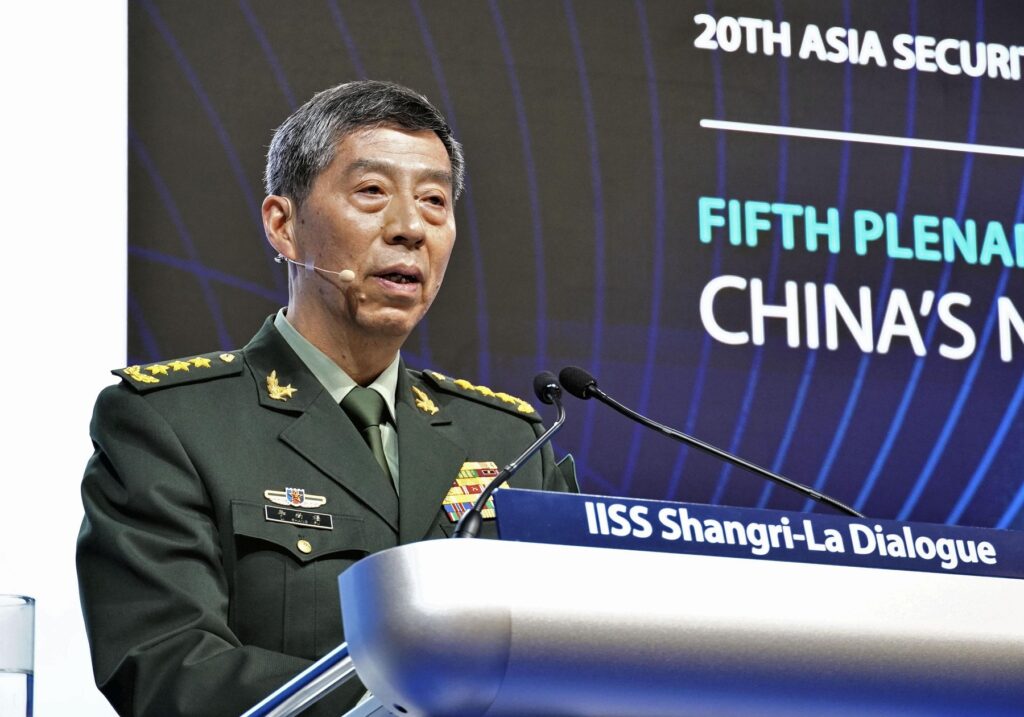
– At the annual Shangri-La Dialogue defense summit in Singapore, Chinese Minister of Defense Li Shangfu warned against “resurging” “cold war mentality,” criticizing “some country” for intensifying arms race and interfering in other countries’ internal affairs. Minister Li also said that “a severe conflict or confrontation between China and the U.S.” would be “an unbearable disaster for the world.”
– In separate addresses at the Shangri-La Dialogue, U.S. Secretary of Defense Lloyd Austin and U.S. National Security Advisor Jake Sullivan promised that the U.S. will continue patrolling the South China Sea and reaffirmed that the U.S. is seeking nuclear talks with China.
– Secretary Austin and Minister Li shook hands during the Shangri-La Dialogue but did not have a “substantive exchange,” according to the Pentagon.
– As the defense summit was held in Singapore, the U.S. military said that a Chinese warship conducted “an unsafe maritime interaction” as a U.S.-Canadian fleet transited the international waters of the Taiwan Strait.
– U.S. Secretary of State Antony Blinken denounced China’s refusal to hold talks with senior U.S. defense officials following a close midair encounter in the South China Sea. The Chinese Foreign Ministry called upon the U.S. to cease their “dangerous provocations” within the South China Sea.
– Following a request from the U.S. for joint high-level defense talks with China in late May, the Chinese Foreign Ministry stated that Chinese senior defense officials would not meet with their U.S. counterparts at the Shangri-La Dialogue and that the U.S. must “correct its mistaken actions” before a high-level meeting can occur.
– Microsoft and the Five Eyes alliance of western spy agencies released a report stating that Chinese hackers used malware to attack critical infrastructure on the U.S. island of Guam, and was one of the largest cyberattack campaigns ever launched against the U.S. The Five Eyes and Microsoft group also warned of Chinese hacker groups, such as Volt Typhoon, laying the groundwork for future attacks and disruptions.
Associated News References:
“Li Shangfu: China’s defence minister at Shangri-La Dialogue warns of ‘cold war mentality’ in digs at US,” The Guardian, June 4
“China says clash with US would be ‘unbearable disaster’,” Reuters, June 4
“Chinese warship cuts off US Navy ship, marking 2nd military provocation in week,” ABC News, June 4
“U.S. Vows to Continue Patrols Near China and Urges Nuclear Talks,” The New York Times, June 3 [Paywall]
“U.S., China defense chiefs shake hands at security summit, but no ‘substantive exchange’,” Reuters, June 2
“U.S. scolds China for refusing to talk after midair military encounter,” The Washington Post, May 31 [Paywall]
“China responds to US complaint over plane intercept with demand for end to surveillance flights,” AP News, May 31
“Beijing says no meeting between US, Chinese defense chiefs at Singapore gathering,” AP News, May 30
“China says US must ‘correct its mistaken actions’ before top defence chiefs can meet,” South China Morning Post, May 30 [Paywall]
“China Rebuffs Pentagon Chief, Blunting Push for Rapprochement,” The Wall Street Journal, May 30 [Paywall]
“The ball is in their court’: China silent on US request for defence chief talks, senior official says,” South China Morning Post, May 26 [Paywall]
“Microsoft: Chinese hackers hit key US bases on Guam,” BBC News, May 25
“Volt Typhoon and other Chinese groups accused of hacking the US and others,” Reuters, May 25
“Microsoft: State-sponsored Chinese hackers could be laying groundwork for disruption,” AP News, May 24

– At an in-person meeting in Beijing on June 5, senior U.S. and Chinese officials had “candid, constructive and fruitful communication on promoting the improvement of China-U.S. relations and properly managing differences.”
– U.S. CIA Director William Burns made a secret trip to China in May in an effort to keep communication between the two countries stable, according to U.S. officials.
– China and U.S. ally Singapore agreed to establish bilateral defense hotlines to allow for high-level defense communications.
– Military attachés from the U.S. and Australia toured a Chinese garrison in Beijing, China; the first tour of its kind since the beginning of the pandemic.
– The U.S. and 13 other Pacific nations agreed to sign a new trade pact—a pact including policies to strengthen U.S. alliances with “friendly” countries—which is a part of the larger U.S. Indo-Pacific Economic Framework (IPEF).
– The Chinese Minister of Commerce Wang Wentao met with the USTR Katherine Tai in Detroit, Michigan, which followed Minister Wentao’s meeting with U.S. Secretary of Commerce Gina Raimondo in Washington, D.C.
– During the APEC conference in Detroit, Michigan, U.S. Trade Representative Katherine Tai urged trade ministers to “think creatively” on ways to overcome large global challenges around international trade.
– United Auto Workers President Shawn Fain spoke at the APEC conference, stating that “we’re anti-trade (when) it’s a one-sided affair” in calls for a more “balanced” trade relationship with China.
– In their in-person meeting in Washington, D.C., U.S. Secretary of Commerce Gina Raimondo and her Chinese counterpart Wang Wentao shared concerns regarding their respective countries’ trade restrictions and promised to continue exchanges on trade issues.
– U.S. lawmakers have called into question whether or not the Biden administration’s proposed executive order, which would screen billions of dollars from U.S. firms looking to invest in China, would be effective.
Associated News References:
“Senior US, Chinese diplomats hold ‘candid’ talks to avoid escalation of tensions,” AP, June 6
“CIA Chief Made Secret Trip to China,” The Wall Street Journal, June 2 [Paywall]
“China, US ally Singapore agree to establish defense hotline,” The Hill, June 1
“US-China tensions expected to dominate Asia security meeting,” Reuters, June 1
“US, Australian military staff tour China’s Beijing garrison despite freeze on top brass talks,” South China Morning Post, May 29 [Paywall]
“U.S. Delivers Early Win in Asia Trade Pact, but Rifts Surface,” The Wall Street Journal, May 27 [Paywall]
“US-China relations continue to thaw at meeting between trade officials in Detroit,” South China Morning Post, May 26 [Paywall]
“US trade chief seeks new thinking on global challenges as APEC ministers meet,” Reuters, May 25
“At APEC trade meeting, union leaders call for new ‘balance’ with China,” Reuters, May 25
“US, Chinese trade officials express concern about each other’s restrictions,” AP News, May 25
“House panel chair seeks info on proposed U.S. order for China investment,” Reuters, May 25

– American and European officials came together in Sweden to develop guidelines for AI and new technologies, but remained largely split on policies regarding technology trade with China.
– Chinese technology developers are looking to ‘de-China’ in-order to expand into the U.S. due to increasing restrictions on Chinese technology firms who want to operate within the U.S.
– Nvidia’s CEO Jensen Huang is looking to travel to China in-order to meet with executives in the world’s largest chip market, despite growing U.S. curbs on microchip trading.
– The Chinese State Administration for Market Regulation has approved Microsoft’s Activision’s bid to purchase gaming company Blizzard, despite facing large antitrust scrutiny in the U.S.
– Chinese Minister of Commerce Wang Wentao condemned semiconductor controls on China from the U.S. and allies while denouncing Japan’s G7 “smears.”
– Despite large controversies involving China-owned apps and controversies surrounding Bytedance’s TikTok, Chinese apps remain extremely popular in U.S. markets.
– South Korean technology companies will avoid capitalizing on the U.S.-China competition following Beijing’s banishment of U.S. chip manufacturer Micron.
– Renewable energy manufacturer Siemens Gamesa will cut reliance on Chinese suppliers of rare earth metals and permanent magnets, despite the company being nearly 100% dependent on Chinese metals and magnets.
– Ongoing trade restrictions between the U.S. and China on microtrip and technology trading poses “enormous damage” to U.S. technology companies, according to Nvidia CEO Jensen Huang.
Associated News References:
“US and EU officials developing guidelines for AI and other new tech but split over China threat,” South China Morning Post, June 1 [Paywall]
“Chinese tech entrepreneurs keen to ‘de-China’ as tensions with US soar,” Reuters, May 31
“Nvidia’s CEO Plans Trip to Meet China Executives Despite US Curbs,” Bloomberg, May 31 [Paywall]
“China approves Microsoft’s Activision Blizzard acquisition as it still faces hurdles in the US and UK,” South China Morning Post, May 30 [Paywall]
“On Apec sidelines, China’s commerce minister Wang Wentao condemns semiconductor controls and Japan’s G7 ‘smears’,” South China Morning Post, May 29 [Paywall]
“Chinese apps remain hugely popular in the U.S. despite efforts to ban TikTok,” CNBC News, May 29
“South Korea to avoid US-China rivalry, will not capitalise on Beijing’s chip maker ban,” South China Morning Post, May 28 [Paywall]
“Siemens Gamesa to cut reliance on China for rare earths, permanent magnets,” Reuters, May 25
“Chip wars with China risk ‘enormous damage’ to US tech, says Nvidia chief,” Financial Times, May 23 [Paywall]
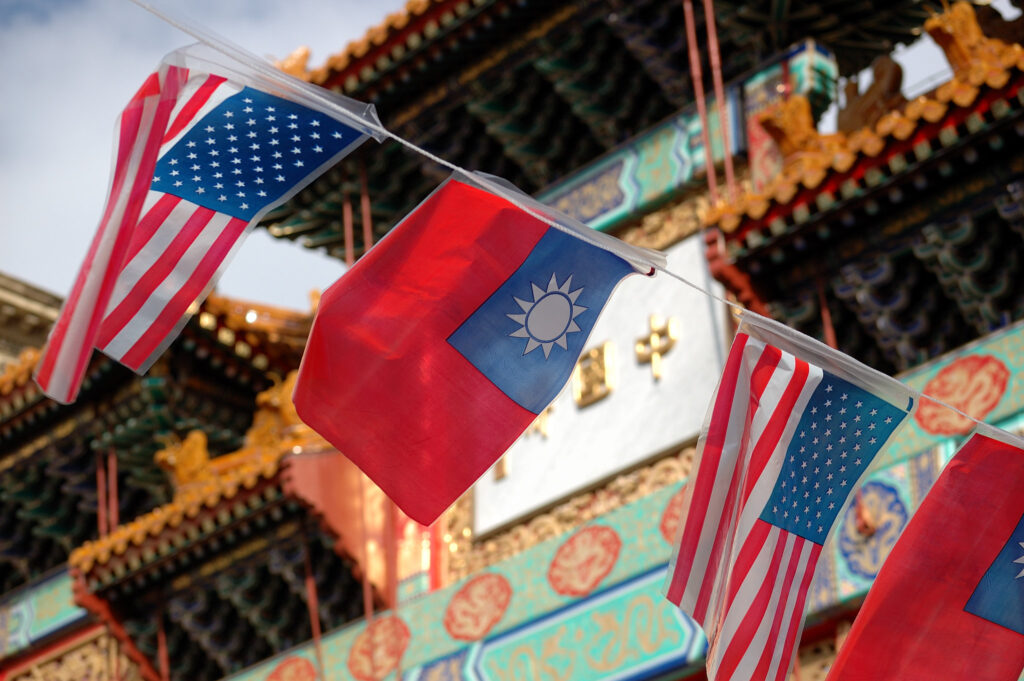
– Laura Rosenberger, the chairwoman of the American Institute in Taiwan and de facto U.S. envoy to Taiwan, began a six-day trip to the island by urging Beijing to keep communication open between China and the U.S. in-order to avoid conflicts and “manage competition responsibly.”
– The U.S. and Chinese senior military officials offered different perspectives during the Shangri-La Dialogue, during which a U.S. and Chinese warship nearly collided in the Taiwan Strait.
– A senior Chinese general, Jing Jianfeng, lashed out at U.S. Secretary of Defense Lloyd Austin following his comments on Taiwanese sovereignty given during the Dialogue.
– JP Morgan CEO Jamie Dimon will visit Taiwan following the completion of his trip to mainland China to visit staff and clients on the island.
– The Chinese Minister of Defense told his Singaporean counterpart that China will “absolutely not” renounce the use of force on Taiwan, in what analysts call a warning to Washington.
– The U.S. and Taiwan have signed a new trade deal under the US-Taiwan Initiative on 21st Century Trade framework, which will strengthen economic ties between the two powers.
– Software problems delayed the delivery of over 60 new F-16 fighter jets to Taiwan from the U.S., but Taiwan still predicts delivery by 2026, according to Taiwanese Minister of Defense Chiu-Kuo Cheng.
– U.S. military experts joined the Taiwanese Ministry of Defense in performing war games to simulate a possible invasion of Taiwan from the Chinese PLA.
– The recent disputes on the U.S. national debt ceiling led the new U.S. House China committee to delay their trip to Taiwan.
Associated News References:
“US’ Taiwan envoy urges Beijing to keep communication lines open to avert conflict,” South China Morning Post, June 5 [Paywall]
“China and U.S. Lay Out Rival Visions for Asia as Ships Nearly Collide,” The New York Times, June 4 [Paywall]
“JPMorgan’s Dimon visits Taiwan to meet staff, clients,” Reuters, June 2
“Shangri-La Dialogue: Chinese general hits out at US Defence Secretary Lloyd Austin over Taiwan,” South China Morning Post, June 3 [Paywall]
“China defence chief’s hard line on Taiwan ‘a message for the region’,” South China Morning Post, June 2 [Paywall]
“US-Taiwan relations: New trade deal signed as China tensions rise,” BBC News, June 2
“Taiwan says software problems delaying new F-16 deliveries,” Reuters, May 25
“US experts joined review of Taiwan’s latest war games simulating PLA attack,” South China Morning Post, May 30 [Paywall]
“Debt ceiling dispute delays US congressional Taiwan trip,” Reuters, May 25
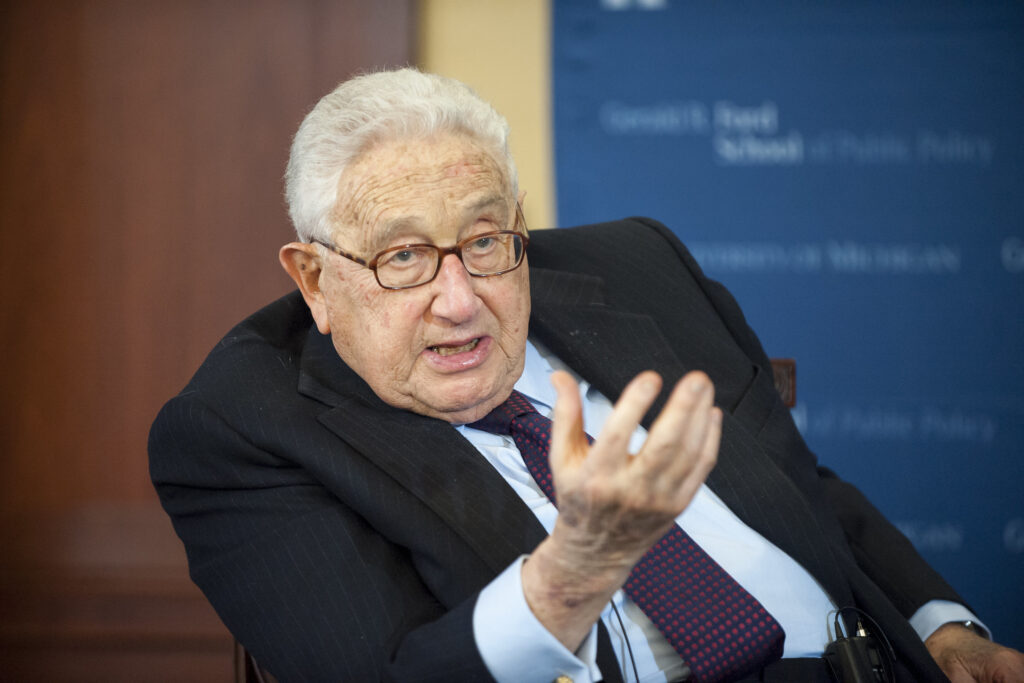
“Exclusive: China’s state banks told to lower cap on dollar deposit rates -sources,” Reuters, June 6
“Chinese robotic assisted surgery system challenges U.S.’s da Vinci,” Nikkei Asia, June 5 [Paywall]
“Tiananmen museum to open in U.S. ahead of crackdown anniversary,” Nikkei Asia, June 2 [Paywall]
“How the U.S.-China clash is being felt on campus,” CNBC News, June 2
“China Crosses a Flying Milestone but Remains in the Boeing-Airbus Grip,” The New York Times, June 1 [Paywall]
“Newly approved US flights by Chinese airlines avoid Russian airspace,” Reuters, June 1
“China Investing in Open-Source Intelligence Collection on the U.S.,” The New York Times, June 1 [Paywall]
“Apple Plans Major Retail Push With New Stores Across China, US,” Bloomberg, June 1 [Paywall]
“Chinese agent or private eye? Ex-NY cop’s ‘Fox Hunt’ trial kicks off,” Reuters, May 31
“Very few U.S.-China flights are back despite the end of Covid,” CNBC News, May 30
“Antony Blinken, in Europe, Sees Alignment on China,” The Wall Street Journal, May 30 [Paywall]
“US Sanctions Chinese Firms Over Pill-Pressing Machines,” Bloomberg, May 30 [Paywall]
“China Jet to Rival Airbus, Boeing Makes First Commercial Flight,” Bloomberg, May 28 [Paywall]
“China’s envoy to US Xie Feng congratulates Henry Kissinger on 100th birthday,” South China Morning Post, May 27 [Paywall]
“US-sanctioned Russian bank CEO hails yuan use while decrying US dollar weaponisation,” South China Morning Post, May 26 [Paywall]
“U.S. warns China could hack infrastructure, including pipelines, rail systems,” Reuters, May 26
June 2-4 hosted by The International Institute for Strategic Studies
May 25 hosted by Center for Strategic and International Studies
May 25 hosted by Brookings
May 24 hosted by Wilson Center
May 24 hosted by Pew Research Center
May 24 hosted by University of Alberta China Institute
June 7 hosted by Foreign Policy
June 7 hosted by Center for Strategic and International Studies
June 8 hosted by Center for Strategic and International Studies
June 14 hosted by Center for Strategic and International Studies
June 15 hearing by U.S.-China Economic and Security Review Commission
June 16 hosted by Center for Strategic and International Studies
June 21 hosted by Foreign Policy
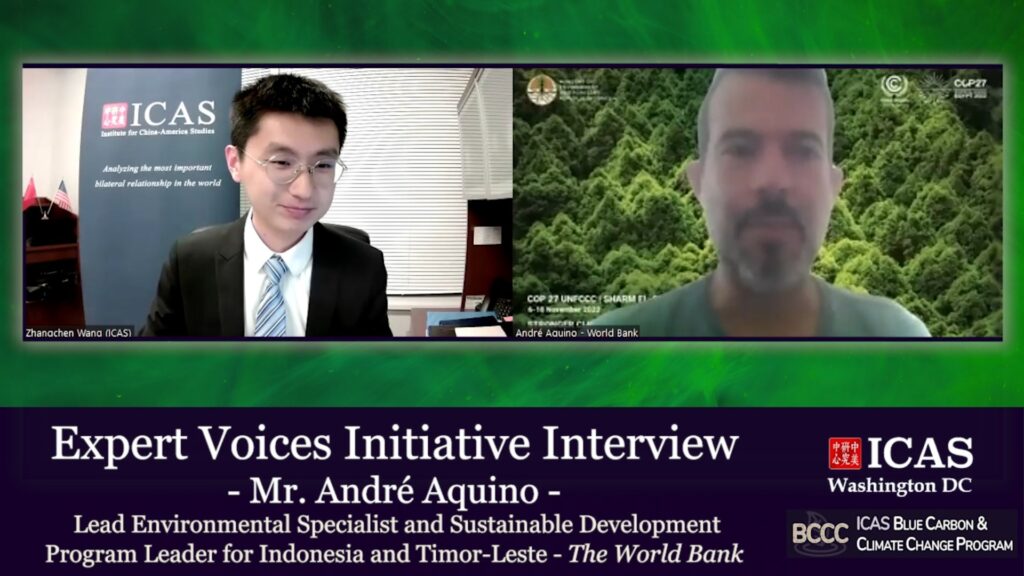
May 25, 2023
The Institute for China-America Studies (ICAS) Expert Voices Initiative (EVI) conducted an interview with Mr. André Rodrigues de Aquino, a Lead Environmental Specialist from the World Bank, on the theme of “Cooperation Between Developed and Developing Countries on Blue Carbon Projects.” The interview was hosted out of Washington, D.C. by Zhangchen Wang, ICAS Blue Carbon and Climate Change (BCCC) Program Research Assistant, while Mr. Aquino spoke remotely from Jakarta, Indonesia.
During the nearly one-hour interview, the host asked Aquino for his views and insights on issues regarding blue carbon damage and degradation in developing countries, challenges facing blue carbon protection, the sustainability of blue carbon development, and the future of blue carbon projects. Aquino responded to all the questions of interest that ICAS and its global audiences submitted while sharing his insightful assessments and valuable experiences. Through this interview, the audience can have a deeper understanding of the current status of blue carbon protection in developing countries, especially in Indonesia, where Aquino resides. Additionally, Aquino talked about the protection and development of blue carbon ecosystems in general, especially mangroves, in developing countries, the problems they are specifically facing, and potential solutions to those problems.
Aquino first described the conflicts of interest encountered in blue carbon ecosystem protection.
Aquino then talked about the serious consequences of blue carbon degradation and proposed some solutions to reverse the situation.
Next, Aquino was asked about the challenges facing blue carbon protection and restoration projects. He divided challenges into three major categories: technical challenges, funding problems, and social issues.
Following that, Aquino was asked about his opinion on the role of sustainable development.
Last, Aquino explained that he is generally optimistic about the future of blue carbon protection.
On Tuesday, May 30, 2023, Senior Fellow Sourabh Gupta was repeatedly quoted in the South China Morning Post on competing U.S.-China summit diplomacy.
On Saturday, May 27, 2023, Senior Fellow Sourabh Gupta discussed US-China trade relations and the APEC meeting on CGTN America’s World Today.
On Friday, May 26, 2023, Senior Fellow Sourabh Gupta discussed the expectations of the G7 Summit in Hiroshima on CGTN’s World Insight.
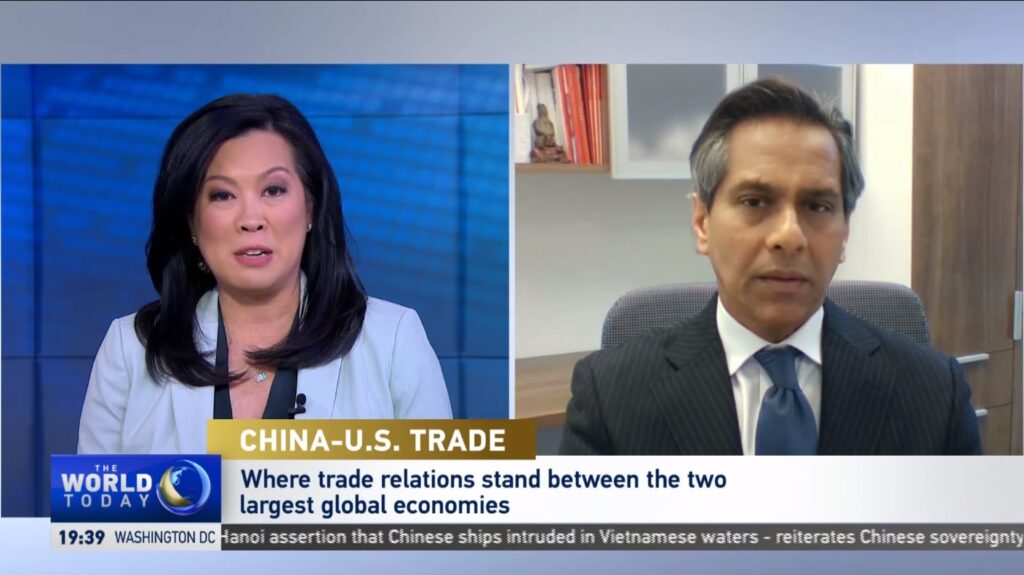


The Institute for China-America Studies is an independent nonprofit, nonpartisan research organization dedicated to strengthening the understanding of U.S.-China relations through expert analysis and practical policy solutions.
1919 M St. NW Suite 310,
Washington, DC 20036
icas@chinaus-icas.org
(202) 968-0595
© 2025 INSTITUTE FOR CHINA-AMERICA STUDIES. ALL RIGHTS RESERVED.